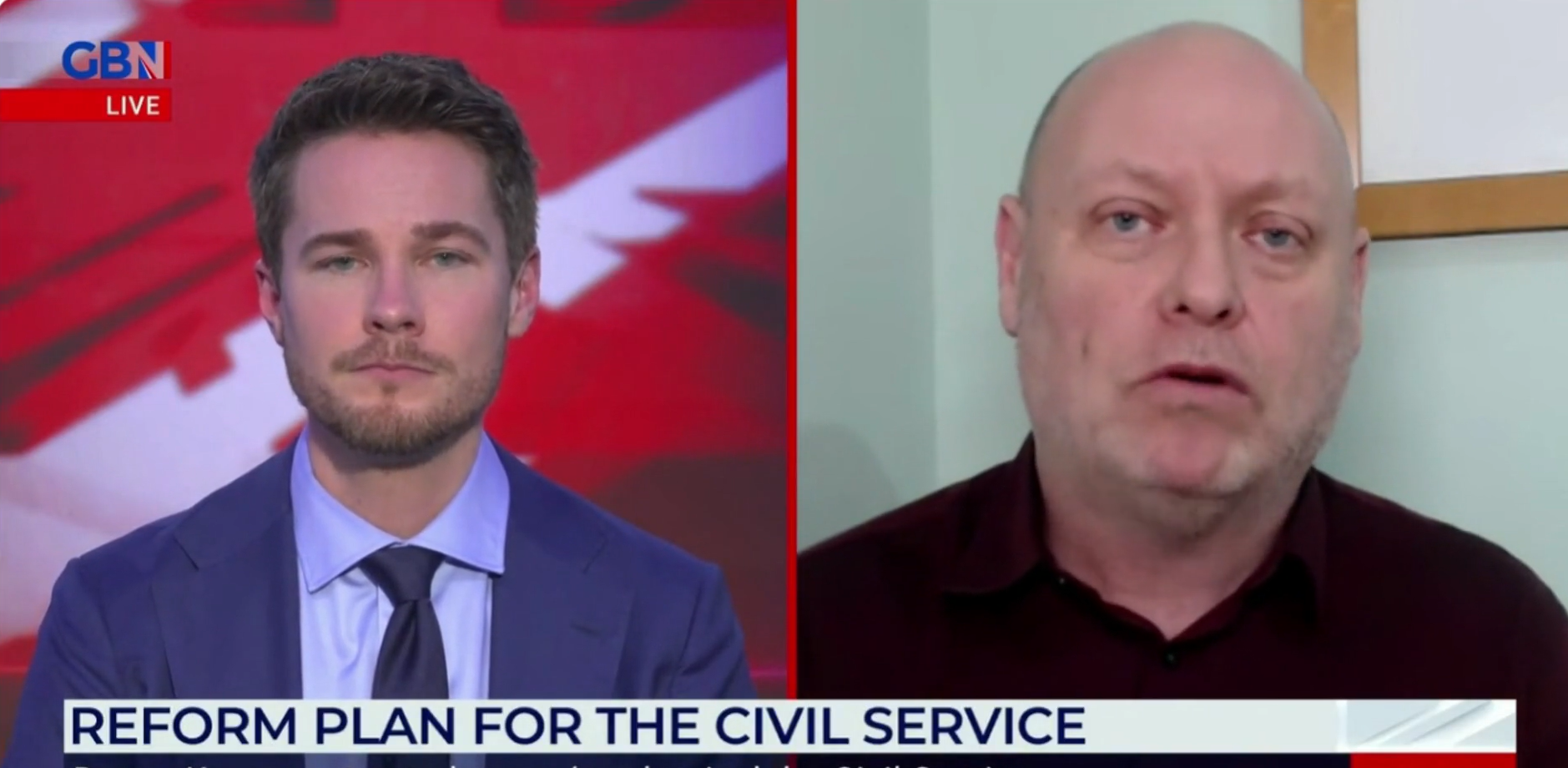Direct defence: Kay Hender speaks with Jon Thompson

I meet Jon Thompson in the maze-like Ministry of Defence (MoD) Main Building; the Grade I-listed structure contains a 16th-century vaulted undercroft that was once Henry VIII’s wine cellar, as well as several 18th-century rooms. When I finally reach the right floor, unusually–and refreshingly–I’m greeted by Thompson himself. Most interviews with Permanent Secretaries take place in their office, but as Thompson has an open-plan desk I’m guided to a quieter meeting room.
Why open plan? Thompson says he’s “trying to set a different tone. This is an incredibly busy job but I’m accessible. Perhaps I hold a position of power and authority but on a basic level I’m a dad, I’m a husband, I have a family network, just the same as many other people do. That’s my take on it.”
Thompson’s career took him “from a rough part of west Norwich with a working-class background, though apprenticeships, to local government, on to one of the Big Four [the four largest global professional services networks], through international financial services, back into local government and then into the civil service”. After working his way through various departments and increasingly senior finance-related roles, he has held the role of MoD Permanent Secretary for three years (see box).
The newly-created post of Civil Service Social Mobility Champion was added to Thompson’s portfolio this summer. After stating in his blog that the civil service “is still considered a bit of a closed shop at the top”, Thompson considers that it “needs to have a fairly radical agenda of change. This had to be about all of the processes of recruiting, retaining, training, learning and development. That’s a quite an aggressive agenda… We’ve got an initial framework that we want to take forward but I’m really open to ideas. I’d be very happy to engage with the unions about how they view this.”
Thompson aims to “break some of the myths… there are some fantastic people in the civil service who had amazing journeys to get to where they are, and we don’t really highlight that and celebrate it. I think that’s a really important part of role modelling, that there are people you can aspire to.” Having done this himself with pupils at his old secondary school, Thompson has seen how important it is “just getting them to realise that there’s a great world of opportunity out there and if they were more confident about themselves they could access all of that. Their frame of reference is too small and there are all these amazing things that they could do.”
Thompson sees his biggest challenge as “recruiting, retaining and motivating talented people – there just aren’t enough to do what we need to do. It’s complicated by the Government’s reward strategy… it’s something I’m concerned about.”
So how can the civil service keep hold of the talent it has? “People whose primary motivation is reward are going to be attracted by switching and I can understand that. There’s only so much that you can offer in terms of things more than pay, learning and development, and fantastic things to do. We try to make people an attractive offer but in the end, people have to make individual decisions about what’s going to drive them along in their career. I totally respect that.”
The MoD has found some innovative ways to deal with the conflict between the public sector pay policy and needing to ensure that commercially-facing roles can ttract competitive salaries, such as the bespoke trading entity Defence Equipment and Support. An arms-length civil service body, DE&S is exempt from Whitehall pay constraints.
Thompson feels “there are some certain skills where we have to pay a premium, over and above the normal grading system…DE&S is a massive procurement organisation and it requires additional capacity and capability on the commercial side, but that’s not the only skill.”
He reveals that the department has “been working through with PricewaterhouseCoopers a fundamentally different way of structuring a workforce in DE&S. We aren’t quite there yet with a proposition that we can talk to colleagues in the trade union about, but I would expect us to be able to do that at some point soon… I understand that some people will not like that, but in the end I’ve got an obligation to try and drive the outputs and therefore we should look at those kinds of options because those are the right things to look at.”
Thompson also accepts and “totally understand[s] that in the course of the last Parliament peoples’ take-home pay went down in cash terms. I’ve been clear in expressing that impact to anyone who wants to listen, including Ministers, but the Government sets an overall pay policy and then we have to follow that”.
So how would he convince a newly-qualified graduate to join the civil service, rather than the private sector? “Whether you’re a scientist or a medic, or you’ve done a policy degree, whether you’re a finance or commercial person, there are fantastic things to do in the Ministry of Defence because it is an enormous organisation that does some of the most incredible things, and therefore there’s plenty of opportunity to make a real difference.”
Having interviewed Thompson before the publication of the Strategic Defence and Security Review (SDSR) – which confirmed cuts of almost 30% to MoD civil service staff over the next five years, following previous cuts of approximately one-third of civilian staff since 2010 – he’d previously said “we are not attempting some sort of really blunt instrument saying ‘we’re going to cut the civil service like this and then work out the rest of the parts’, we’re trying to much more sophisticated than that”. In light of this, I contact him to ask about the post-SDSR implications for civil servants within the MoD.
He admits that the department “needed to take difficult decisions, and reducing civil servant numbers will enable us to fund new capabilities in a challenging security landscape.” However, he’s keen to point out that “this headline reduction is not announcing all new changes. Around a third of the reductions are already happening through existing change programmes and decisions made in the last Parliament… [while] a further third or so will come from other reforms that we have been actively considering.
“That then leaves the department to find a third or so. We’ve agreed with the Treasury that it makes most sense to make efficiencies over the longer term, to really scrutinise how we can work differently in a considered way. A series of reviews will look across the MoD examining areas where we can optimise our use of technology, work from different locations and consolidate functions.”
Despite the MoD extolling its ‘whole force approach’, giving equal consideration to both its military and civilian staff, FDA’s members within the department have voiced concerns at their military colleagues receiving more plaudits or recognition, and fewer reductions. Thompson sees this as “a particularly negative reading of the evidence… If it was not for civil servants in the Ministry of Defence, this organisation would not function, let’s be blunt about it. There are great civil service colleagues and there are great military colleagues but it’s the combination of the two that makes this place work.
Thompson’s take is that “the significant difference between military and civilian colleagues is that the national press is more interested in what military colleagues do… The Daily Mail doesn’t want to interview me, because it’s got me down as a stereotypical mandarin who’s stopping doing something, but it would love to interview the Chief of the Defence Staff… Civil servants do amazing things in the MoD and I’m incredibly proud of our contribution. We are absolute equals in this enterprise and that’s the way it should be.”
While he may not get national press coverage, Thompson feels “it’s absolutely vital for people like me to be very visible within the organisation. I do as many open Q&A sessions as I can… I think it’s incredibly important that I’m accountable to the organisation”.
He claims to be “well through three figures” in visits of the 900 MoD sites. “I get a lot of email that say ‘you say you’re accountable for this thing, answer this question’. They get a personal response from me. I think it’s absolutely the right thing. Chief Execs should be accountable to people.”
While Thompson admits he isn’t left with much free time, he is “totally happy to give the MoD and the Government pretty much everything Monday to Friday, but the weekends I try to keep as mine and that of my family… There are different ways of coping with doing a job like this. This is one of the most awesome things you could ever do. It’s pretty demanding but it’s undoubtedly one of the best jobs in the economy”.
Related News
-

Why anonymous attacks must stop: Dave Penman on the “damage” caused by briefings
FDA General Secretary Dave Penman on the untold damage done by anonymous briefings against the civil service, and why this pattern needs to change.
-

Member focus: mentee into mentor
Member Sabrina Schalz applied for the Fast Stream (FS) whilst pregnant, and took her baby with her to the FS Base Camp. Katherine Hutchinson finds out more about the support Schalz received when navigating the FS application and her decision to become a mentor herself.
-

Reform UK’s plans to cut swathes of corporate functions without impacting frontline services “unrealistic”, says FDA
The FDA has responded to Reform UK’s proposals for civil service reform if the party enters government, which include plans to cut 68,500 jobs, a reduction of 13%.